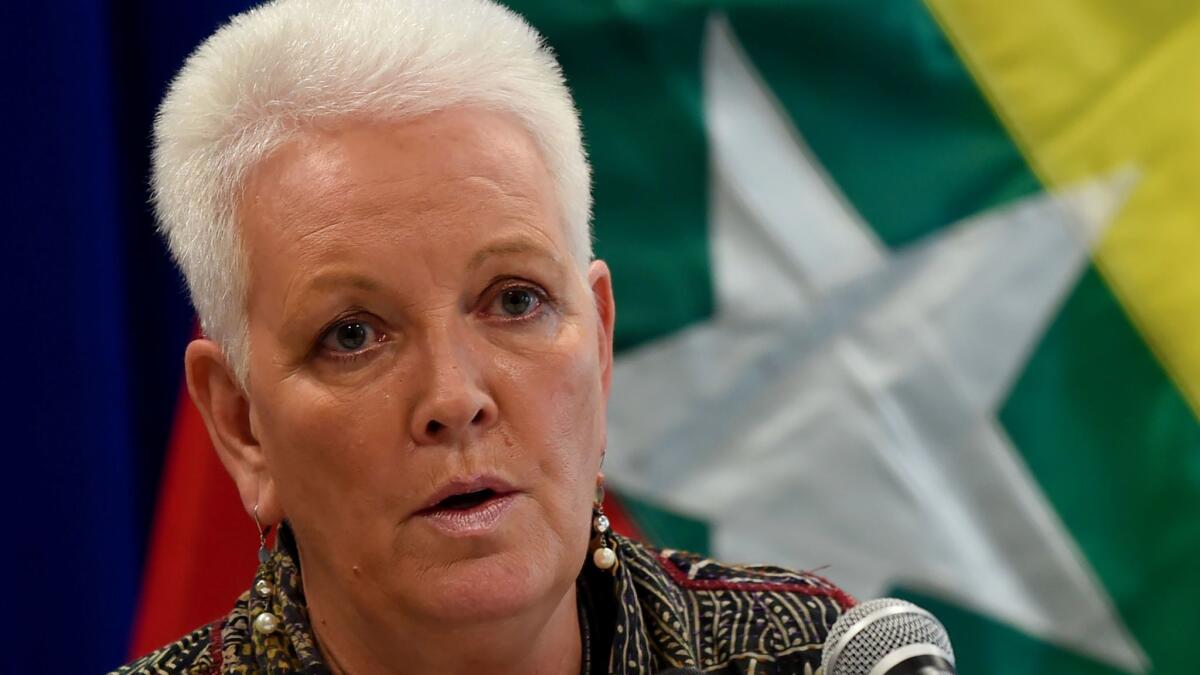U.S. foreign aid boss highlights success in exit memo, but critics say it’s time to overhaul the agency
- Share via
Boasting a host of accomplishments, the head of the government’s foreign aid agency presented President Obama with an exit memo Thursday that highlighted the administration’s development initiatives over the last eight years. But she warned that many challenges remained and “the road ahead won’t be easy.”
“For all of the impressive gains the global community has achieved, there are far too many people dying of diseases we can prevent,” Gayle Smith, the administrator of the United States Agency for International Development, wrote in the 14-page report. “Too many kids go to bed hungry each night. And too many people are denied the most basic of human rights.”
Smith is scheduled to vacate her position when President-elect Donald Trump takes office on Jan. 20. Her successor is yet to be named.
USAID has largely enjoyed bipartisan support. But it remains unclear how the Trump administration might approach development aid. The president-elect has revealed very little about his foreign aid policy, although during last year’s election campaign he promised not to participate in nation-building and voiced objections to continuing to send aid “to countries that hate us.”
“We do not know yet, but it is not too difficult to imagine a scenario where all development aid not directly connected to national security issues would be under pressure of cutback,” said Kevan Harris, an assistant professor of sociology at UCLA who studies development and social change in the global South.
Harris described USAID’s record under Obama as “mixed.”
Other development specialists expressed concern over the possibility of a smaller aid budget under the incoming administration.
“There may be a shifting of emphasis where aid goes,” said Sam Worthington, chief executive of InterAction, the largest U.S. alliance of nongovernmental international organizations, with more than 220 members and partners. “We may find ourselves pulling back from areas where a decrease in aid actually results in people not having access to food or basic services.”
Scott Morris, a senior fellow at the Washington-based Center for Global Development, said much would depend on the Trump administration’s pick for leadership of USAID. “We just don’t know,” he said.

In her memo, Smith ticked off areas in which the United States had helped to change people’s lives for the better. These included:
-- reducing poverty, malnutrition, and mortality.
-- promoting entrepreneurship and innovation.
-- empowering women and girls.
-- helping to build more stable, accountable and inclusive partners for the United States.
The U.S. is the largest donor of foreign aid, representing about 24% of development assistance from major governments in 2014.
Smith said the agency had helped combat hunger and extreme poverty through its Feed the Future initiative, which focuses on developing agriculture. Its work in 19 nations has helped reduce extreme poverty in parts of sub-Saharan Africa, she said.
Other accomplishments included the 2013 launch of Power Africa, which aims to add 30,000 megawatts and provide 60 million electricity connections in sub-Saharan Africa by 2030. Smith also touted the administration’s success in promoting global health, including helping to end preventable child and maternal deaths. Those efforts helped save the lives of 4.6 million children and 200,000 women in the last eight years, she said.
The USAID report card won praise from some sectors of the development aid community.
Worthington of InterAction lauded the agency’s expansion of existing programs, the launch of innovative initiatives and its partnering with the private sector, universities and nonprofit organizations .
He said the shift from “being purely an implementer of projects” to an agency that can “leverage resources far beyond the U.S. government” had made USAID a very different organization than it was at the start of the Obama administration.
“The result has been large populations reached that would not have been reached otherwise,” Worthington said.
Morris, who also directs the Center for Global Development’s U.S. Development Policy Initiative, said Feed the Future and Power Africa stood out as key accomplishments.
“Frankly, it would not have been obvious eight years ago that one would want to empower USAID with these major presidential initiatives in terms of the capacity of the agency,” Morris said. “I think that really has been a mark of change that they have successfully led these major presidential initiatives.”
Morris also pointed to reforms that have strengthened the agency, such as elevating its role within the government.
“It has a much clearer policy voice,” Morris said. “Senior aid officials are now sitting side by side with the generals ... in conversations and important discussion around security issues globally.”

But the glowing report card faced pushback from some global development analysts.
James Roberts, a research fellow for economic freedom and growth at the conservative Heritage Foundation, slammed Smith’s report as “something of a cheerleading memo, with lots of pictures and lots of big numbers and metrics that we would have to examine in detail to really understand.”
Roberts said his organization was recommending that the new administration look at foreign aid “and really just overhaul the whole mechanism.”
“Some aspects of USAID’s work can and should continue,” Roberts said. “The question is, which ones? There’s too much fragmentation across too many agencies right now. [Smith’s] memo wants AID to continue as is and expand as an independent agency. We oppose that.”
The Heritage Foundation has called for an independent evaluation of all assistance programs, a comprehensive update of the 1961 Foreign Assistance Act, and the renewal of efforts to bring USAID directly into the State Department and end its role as an independent agency, Roberts said.
There were also other areas where analysts faulted USAID under Obama.
Harris, the UCLA professor, said that although the agency had managed to increase resources for food security, refugees and healthcare and had largely been able to protect effective development projects from pressure by Congress, some of its projects were linked too tightly with the foreign policy goal of preventing terrorism.
“Terrorism is a violent form of doing politics, not a direct response to economic privation,” Harris said. “The more USAID can de-link these two policy goals, global development versus anti-terrorism, the better.”
For more on global development news, see our Global Development Watch page, and follow me @AMSimmons1 on Twitter
ALSO
People are dying because of an audacious cash policy that India says will modernize its economy
The world could wipe out malaria. A new report shows why that isn’t happening
More to Read
Sign up for Essential California
The most important California stories and recommendations in your inbox every morning.
You may occasionally receive promotional content from the Los Angeles Times.














